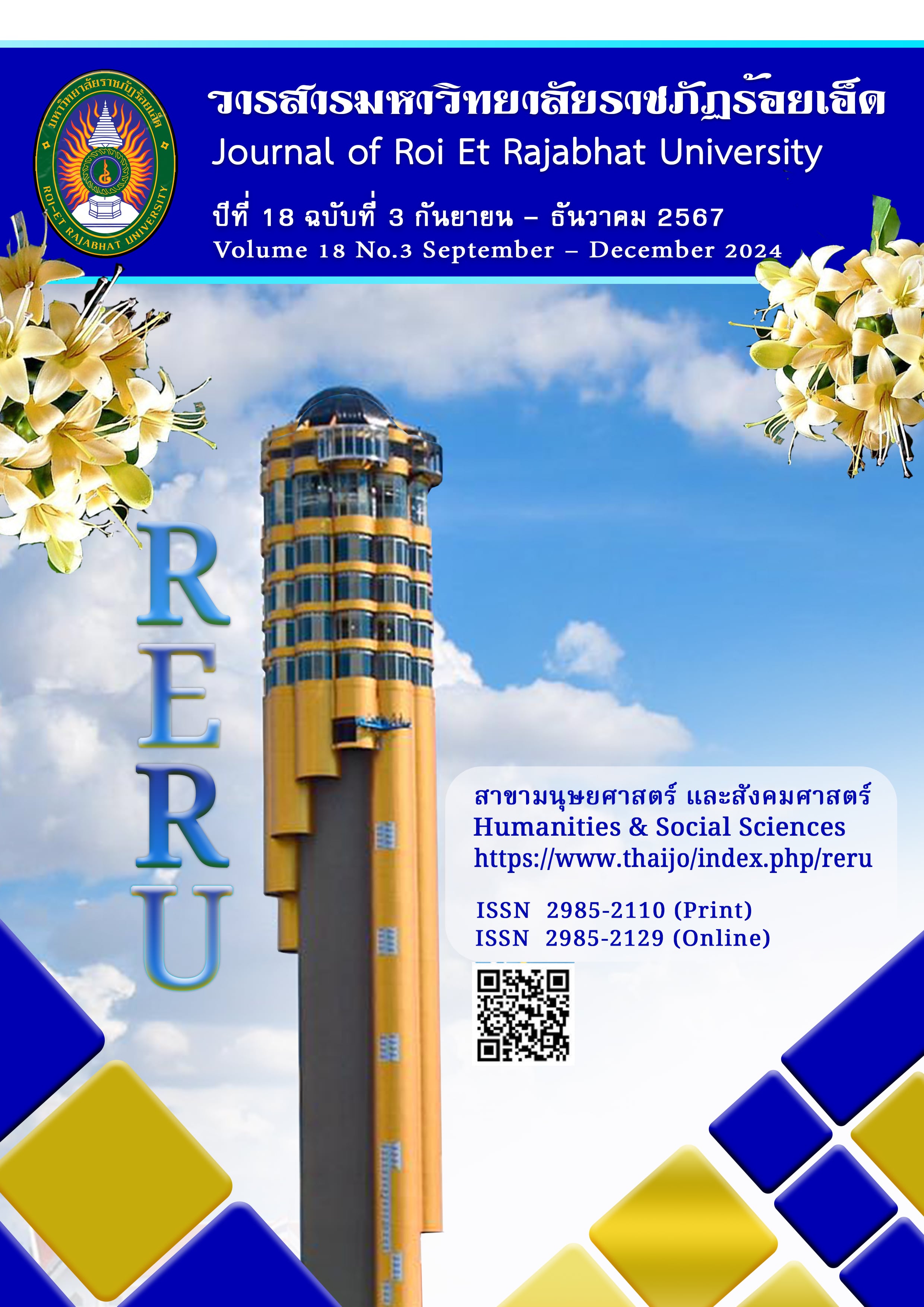Social Capital as a Driving Process for Thai Community Enterprises
Keywords:
social capital, the process drives, community enterpriseAbstract
This article aims to presents a study of the role of social capital toward community enterprises, focusing on strengthening and developing these enterprises. This paper also examines the process of utilizing social capital in the management of community enterprises. The study employed document analysis by reviewing research and theories related to social capital, particularly concepts from scholars concerning social network building and community enterprise development.
The study revealed that social capital played a significant role in community enterprises. Various types of social capital were identified, including physical capital, cultural capital, human capital, relational capital, and network capital. Each form of social capital contributes to the establishment, development, and sustainable growth of community enterprises, leading to their success. Furthermore, the study found that the key factor in the process of utilizing social capital in the management of community enterprises was local knowledge and wisdom, which is a form of social capital in the community. The use of social capital can create a competitive advantage for community enterprises in three main aspects: 1) community participation, 2) forming enterprise community, and 3) applying local knowledge and wisdom. However, the use of social capital may also serve the interests of specific groups such as using social capital to gain support in local elections, which could lead to the influence of groups with more social capital than others.
References
กรมส่งเสริมการเกษตร. (2564). ความรู้เบื้องต้นเกี่ยวกับภูมิปัญญาท้องถิ่นในงานส่งเสริมการเกษตร. นนทบุรี: โรงพิมพ์ชุมนุมสหกรณ์การเกษตรแห่งประเทศไทย จำกัด.
กระทรวงเกษตรและสหกรณ์. (2558). พระราชบัญญัติส่งเสริมวิสาหกิจชุมชน พ.ศ. 2548. สืบค้นเมื่อ 9 ตุลาคม 2567, จาก https://www.moac.go.th/law_agri-preview-391991791824
กฤษฎา ศุภกิจไพศาล. (2566). กระบวนทัศน์การจัดสวัสดิการชุมชนภายใต้แนวคิดทุนทางสังคมในเชิงอุดมคติ. วารสารสังคมสงเคราะห์ศาสตร์, 31(1), 1-46.
ดวงพร เลิศลำหวาน. (2566). ทุนทางสังคมกับการพัฒนาผลิตภัณฑ์ชุมชนของกลุ่มแม่บ้านเกษตรสตรี จังหวัดชลบุรี. วิทยานิพนธ์ รัฐศาสตรมหาบัณฑิต สาขาวิชาเศรษฐศาสตร์การเมืองและการจัดการปกครอง. ชลบุรี: มหาวิทยาลัยบูรพา.
ทักษณา สง่าโยธิน. (2563). การพัฒนาศักยภาพวิสาหกิจชุมชนกลุ่มจังหวัดภาคใต้ชายแดนเพื่อยกระดับความสามารถในการแข่งขัน. โครงการวิจัยที่ได้รับทุนอุดหนุนการวิจัย และนวัตกรรม งบประมาณเงินอุดหนุนการวิจัยจากเงินรายได้ วิทยาลัยพาณิชยศาสตร์. ชลบุรี: มหาวิทยาลัยบูรพา.
ธัญญรัตน์ ทิวถนอม. (2561). ทุนทางสังคมของคณาจารย์โรงเรียนนายร้อยตำรวจ. นครปฐม: โรงเรียนนายร้อยตำรวจ.
ธิชาภรณ์ กำนันตน, มาริษา อนันทราวัน และโชติ บดีรัฐ. (2563). PLC ชุมชนแห่งการเรียนรู้ทางวิชาชีพสู่การพัฒนาวิสาหกิจชุมชนอย่างยั่งยืน. Journal of Modern Learning Development, 5(4), 159-172.
ธนิกานต์ ศรีจันทร์ และสัญญา เคณาภูมิ. (2565). การพึ่งตนเองของวิสาหกิจชุมชน. วารสารสหวิทยาการเพื่อการพัฒนา มหาวิทยาลัยราชภัฏอุตรดิตถ์, 12(2), 1-16.
นงนุช ศรีสุข. (2563). ทุนทางสังคมที่ส่งผลต่อการเสริมสร้างความเข้มแข็งของวิสาหกิจชุมชนศูนย์ข้าวบ้านจิก อำเภอวัฒนานคร จังหวัดสระแก้ว. วารสารสหวิทยาการ วิทยาลัยสหวิทยาการ, 17(2), 78-100.
นวรัตน์ นิธิชัยอนันต์ และนภาพรรณ พัฒนฉัตรชัย. (2561). การพัฒนาเครือข่ายวิสาหกิจชุมชนชายแดนไทย-กัมพูชา: กลุ่มวิสาหกิจชุมชนโรงสีข้าวบ้านโจรก. วารสารวิจัยและพัฒนา มหาวิทยาลัยราชภัฏเลย, 13(46), 101-111.
ประภัสรา ปราชญา และพีระพงศ์ ภักคีรี. (2564). แนวทางการพัฒนาวิสาหกิจชุมชนให้ยั่งยืนด้วยภูมิปัญญาท้องถิ่น กรณีศึกษา วิสาหกิจชุมชนบ้านคลองสำโรง อำเภอบ้านแพ้ว จังหวัดสมุทรสาคร. การศึกษาอิสระ รัฐศาสตรมหาบัณฑิต สาขาวิชาสหวิทยาการเพื่อการพัฒนาท้องถิ่น. กรุงเทพฯ: มหาวิทยาลัยรามคำแหง.
พัชราภรณ์ ตาละลักษมณ์, อรนัดดา ชิณศรี และธีราพร ทองปัญญา. (2562) ทุนทางสังคมกับการสืบสานภูมิปัญญาท้องถิ่น สกุลช่างเมืองเพชรของเยาวชนกลุ่มลูกหว้าจังหวัดเพชรบุรี. วารสารพัฒนาสังคม, 21(2), 28–44.
พระปลัดประพจน์ สุปภาโต, พระมหาประกาศิต สิริเมโธ และทินกฤตพัชร์ รุ่งเมือง. (2563). ทุนทางสังคมกับการพัฒนาชุมชนวัดสำโรง อำเภอนครชัยศรี จังหวัดนครปฐม. วารสารสันติศึกษาปริทรรศน์ มจร, 8(3), 828-840.
ศิริพร เพ็งจันทร์และปทิดา โมราศิลป์. (2563). ทุนทางสังคมกับการจัดการท่องเที่ยวบนฐานชุมชนเชิงสร้างสรรค์ กรณีศึกษาพื้นที่เศรษฐกิจ วัฒนธรรมและธรรมชาติ อำเภอเวียงสระ จังหวัดสุราษฎร์ธานี. การวิจัยจากกองทุนวิจัย วิทยาเขตสุราษฎร์ธานี มหาวิทยาลัยสงขลานครินทร์. สงขลา: มหาวิทยาลัยสงขลานครินทร์.
สำนักงานนโยบายและกลยุทธ์การค้า. (2566).การพัฒนาศักยภาพวิสาหกิจชุมชนเพื่อยกระดับเศรษฐกิจฐานราก. สืบค้นเมื่อ 8 ตุลาคม 2567, จาก https://tpso.go.th/document/2404-0000000003
สำนักงานส่งเสริมวิสาหกิจขนาดกลางและขนาดย่อม. (2567). รายงานสถานการณ์วิสาหกิจขนาดกลางและขนาดย่อม ประจำปี 2567. สืบค้นเมื่อ 12 ตุลาคม 2567, จาก https://shorturl.asia/jleXL
สุทธิชัย รักจันทร์. (2566). เงื่อนไขทางเศรษฐกิจและการเมืองที่เอื้อให้นักการเมืองเข้ามามีบทบาทในกีฬาชนวัวในจังหวัดพัทลุง. วารสารสถาบันพระปกเกล้า, 2566, 153-154.
สุนิตย์ เหมนิล. (2564). ทุนทางสังคมกับการประกอบสร้างวิสาหกิจชุมชน กรณี กลุ่มประมงดอนแก้ว อำเภอกุมภวาปี จังหวัดอุดรธานี. วารสารพัฒนาสังคม, 23(1), 118-142.
สุภณิดา พวงผกา และธัชกร ธิติลักษณ์. (2566). การปฏิบัติการของทุนทางสังคมในการขับเคลื่อนวิสาหกิจชุมชน กลุ่มธุรกิจท่องเที่ยวโดยชุมชน. วารสารศิลปศาสตร์และอุตสาหกรรมบริการ, 6(2), 345-365.
ส.ศิริชัย นาคอุดม, ธนกฤต ยอดอุดม และเพียงพิศ ศรีประเสริฐ. (2563). ทุนทางสังคม: ความได้เปรียบเชิงการแข่งขันของวิสาหกิจชุมชน. วารสารนักบริหาร, 40(1), 115-124.
Coleman, J. S. (1988). Social capital in the creation of human capital. American Journal of Sociology, 94 (Supplement), 95-120.
Pierre-Richard, A. and Hinh, T. D. (2013) Social Capital, Product Imitation and Growth with Learning Externalities. Policy Research Working Paper 6607.
Putnam, R. D. (1993). Making Democracy Work: Civic Tradition in Modern Italy. New Jersey: Princeton University Press.
Putnam, R. D. (2000). Bowling alone: America's declining social capital. Journal of Democracy, 6(1), 65-78.
Downloads
Published
How to Cite
Issue
Section
License
Copyright (c) 2024 Roi Et Rajabhat University

This work is licensed under a Creative Commons Attribution-NonCommercial-NoDerivatives 4.0 International License.
บทความที่ได้รับการตีพิมพ์เป็นลิขสิทธิ์ของวารสารมหาวิทยาลัยราชภัฎร้อยเอ็ด
ข้อความที่ปรากฏในบทความแต่ละเรื่องในวารสารวิชาการเล่มนี้เป็นความคิดเห็นส่วนตัวของผู้เขียนแต่ละท่านไม่เกี่ยวข้องกับมหาวิทยาลัยราชภัฎร้อยเอ็ด และคณาจารย์ท่านอื่นๆในมหาวิทยาลัยฯ แต่อย่างใด ความรับผิดชอบองค์ประกอบทั้งหมดของบทความแต่ละเรื่องเป็นของผู้เขียนแต่ละท่าน หากมีความผิดพลาดใดๆ ผู้เขียนแต่ละท่านจะรับผิดชอบบทความของตนเองแต่ผู้เดียว





